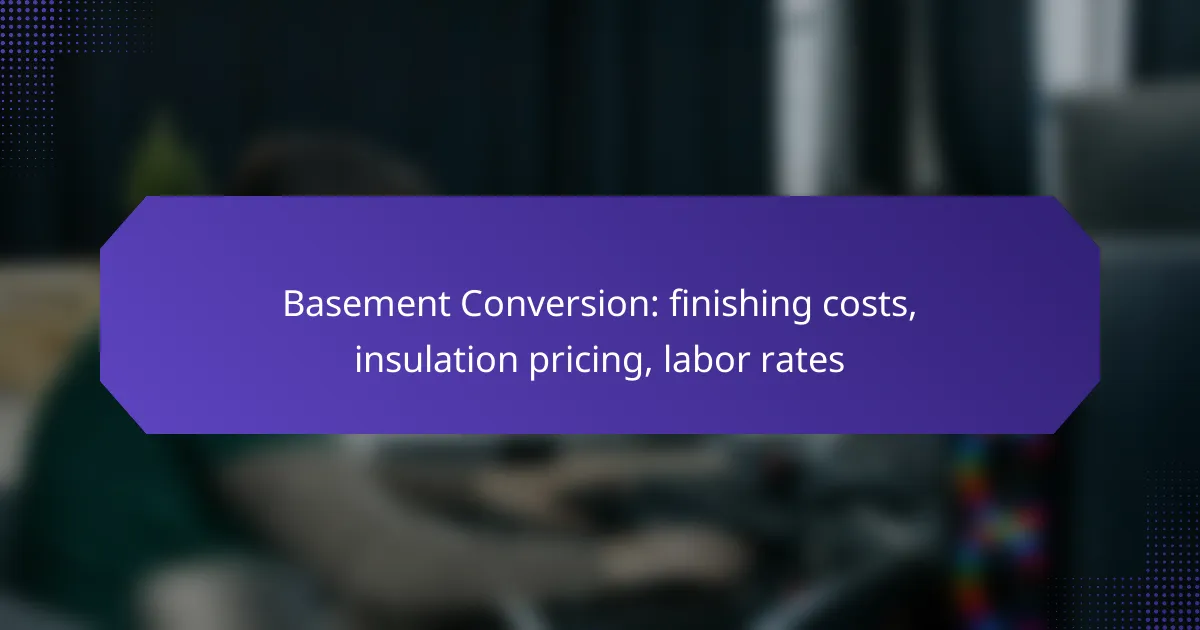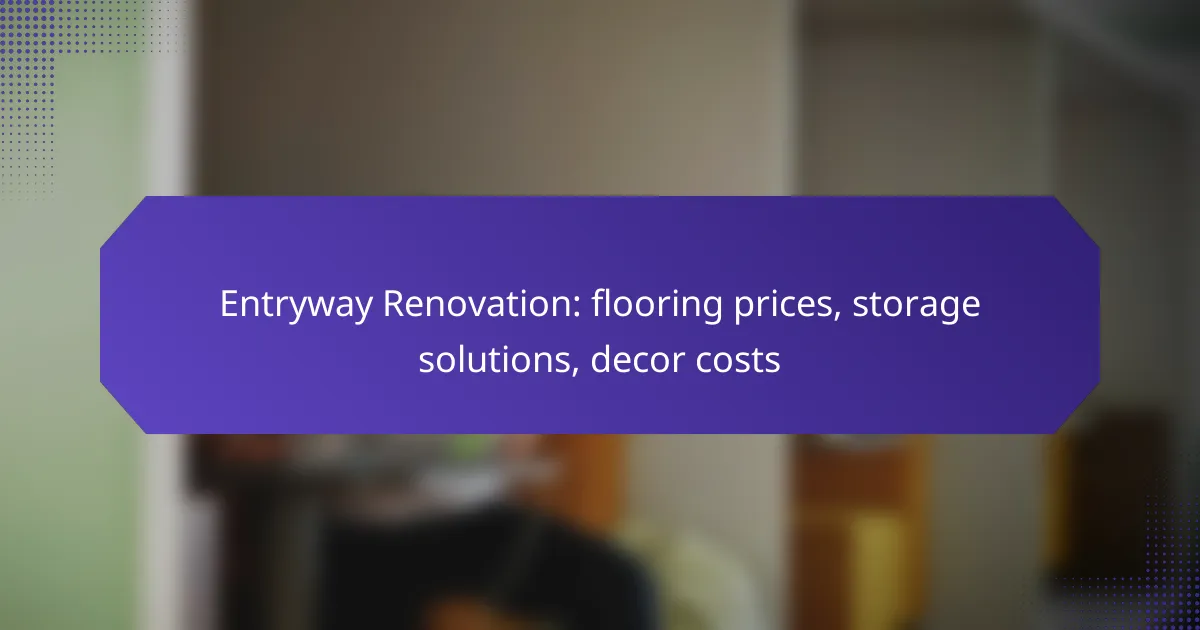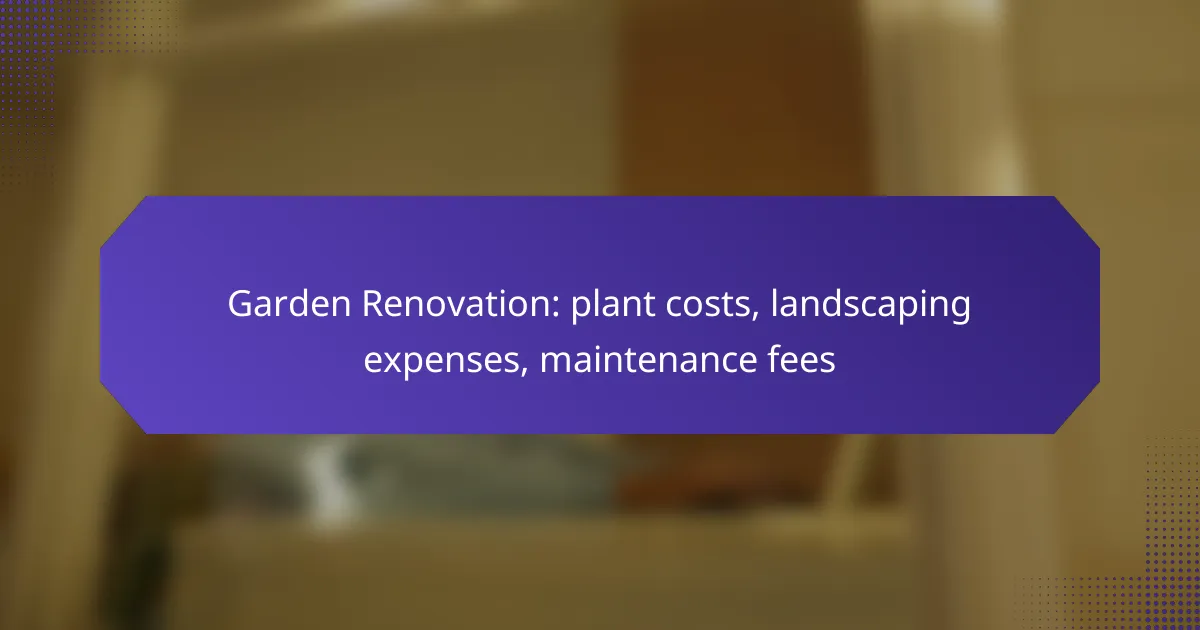Converting a basement can be a significant investment, with average costs in the UK ranging from £30,000 to £60,000 based on size and complexity. Key factors influencing these costs include insulation, which plays a vital role in energy efficiency and comfort, as well as labor rates that typically range from $50 to $100 per hour. Homeowners should carefully evaluate these elements to maximize their investment and enhance their property’s value.
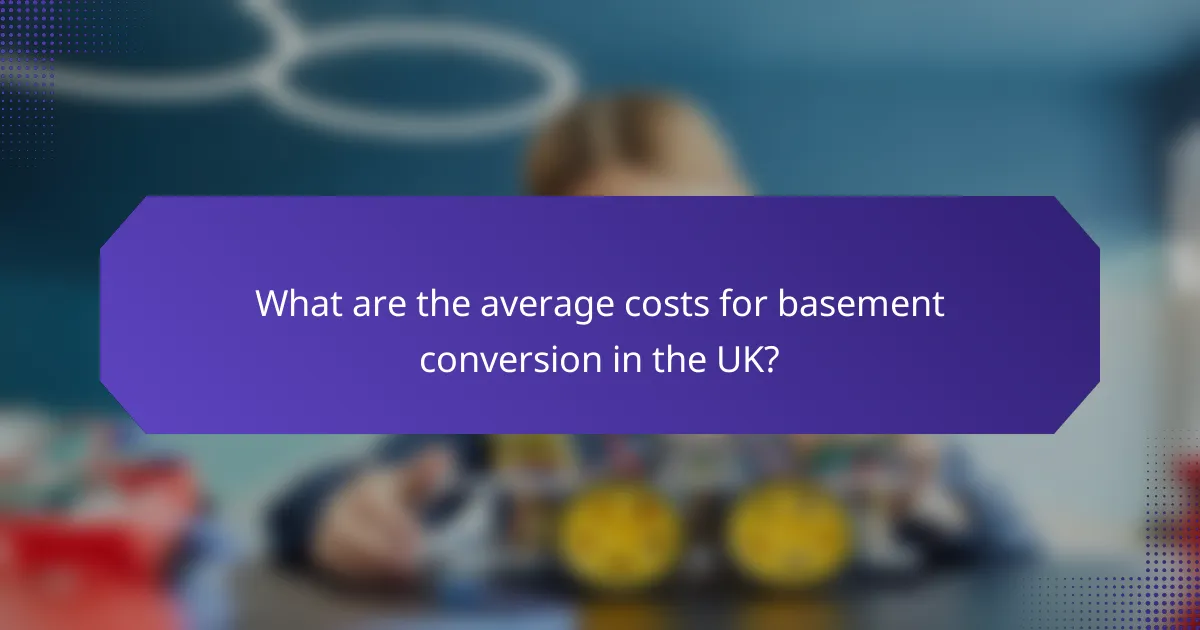
What are the average costs for basement conversion in the UK?
The average costs for basement conversion in the UK typically range from £30,000 to £60,000, depending on various factors such as size, complexity, and finishes. Homeowners should consider both the initial investment and potential increases in property value when planning a basement conversion.
Cost range for finishing a basement
Finishing a basement can cost between £15,000 and £40,000, influenced by the quality of materials and the level of customization. Basic finishes, such as drywall and flooring, will be on the lower end of the spectrum, while high-end fixtures and specialized designs will push costs higher.
Additional features like bathrooms or kitchens can significantly increase the overall price. It’s essential to budget for these extras if you plan to create a more functional living space.
Factors influencing basement conversion costs
Other considerations include insulation requirements, waterproofing measures, and any necessary structural changes. Engaging with a qualified contractor early in the process can help clarify these factors and provide a more accurate estimate.
Cost comparison by region in the UK
Costs for basement conversions can vary significantly across different regions in the UK. For instance, conversions in London and the South East may be higher, often exceeding £70,000, due to increased labor and material costs.
In contrast, areas in the North of England may see lower average costs, ranging from £25,000 to £50,000. It’s advisable to research local market rates and obtain multiple quotes to ensure competitive pricing for your project.
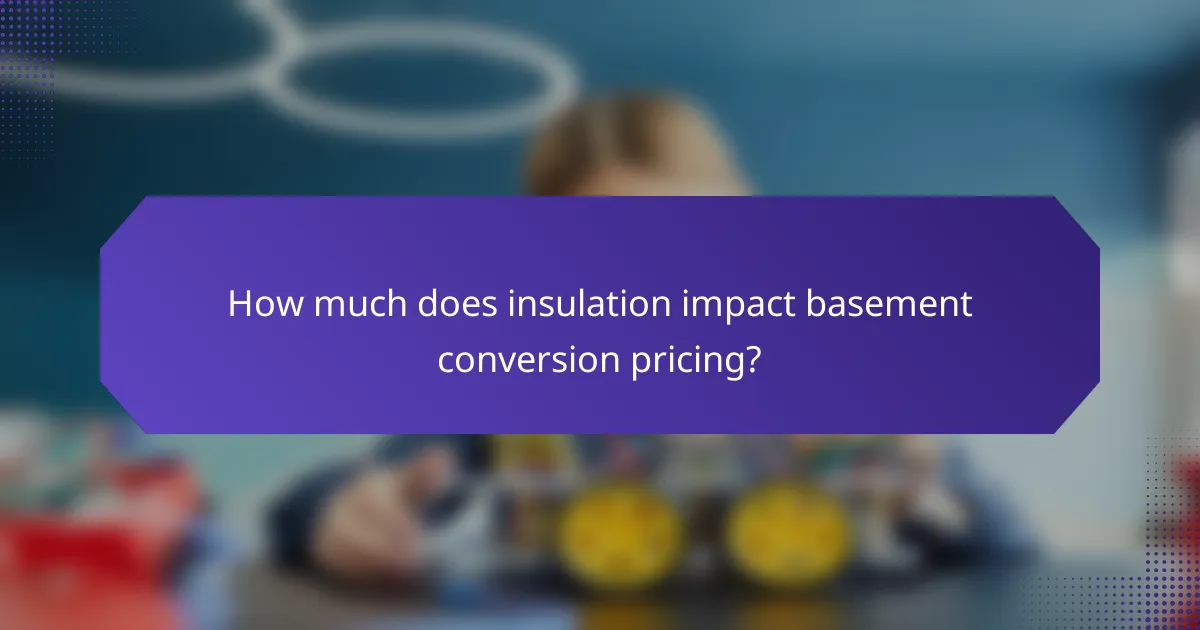
How much does insulation impact basement conversion pricing?
Insulation significantly affects the overall costs of a basement conversion by influencing both material and labor expenses. Proper insulation not only enhances energy efficiency but also contributes to comfort and moisture control, making it a crucial aspect of the project.
Types of insulation materials and their costs
There are several insulation materials commonly used in basement conversions, each with varying costs. Fiberglass batts typically range from $0.50 to $1.50 per square foot, while spray foam insulation can cost between $1.50 and $3.00 per square foot. Rigid foam board insulation is another option, generally priced around $1.00 to $2.00 per square foot.
When selecting insulation, consider factors such as R-value, moisture resistance, and installation location. Higher R-values provide better thermal resistance, which can lead to long-term energy savings.
Cost of insulation installation
The installation costs for insulation can vary based on the type of material and the complexity of the job. On average, homeowners might expect to pay between $1.00 and $2.50 per square foot for professional installation. Labor rates can fluctuate based on local market conditions, often ranging from $50 to $100 per hour.
To ensure a successful installation, it’s advisable to obtain multiple quotes from contractors and verify their experience with basement insulation projects. Additionally, check for any local building codes or regulations that may impact insulation requirements in your area.
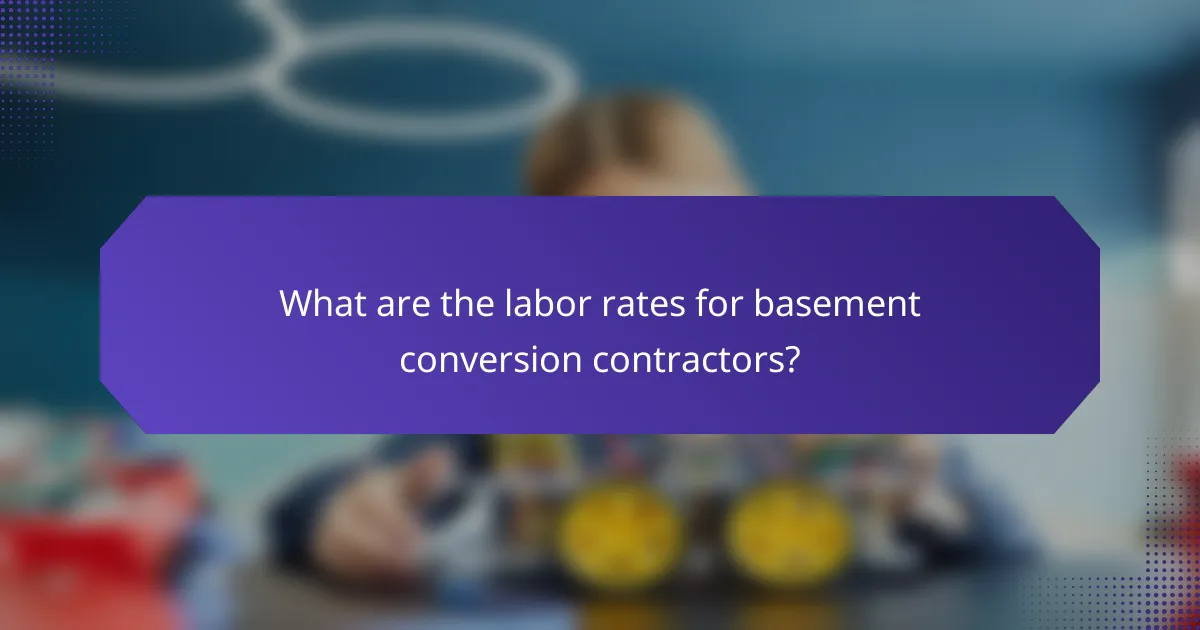
What are the labor rates for basement conversion contractors?
Labor rates for basement conversion contractors typically range from around $50 to $100 per hour, depending on various factors such as location, contractor experience, and project complexity. It’s essential to obtain multiple quotes to ensure competitive pricing and quality workmanship.
Average hourly rates for contractors
On average, contractors charge between $50 and $100 per hour for basement conversions. In metropolitan areas, rates may be higher, often reaching up to $150 per hour for specialized services. Always consider the contractor’s reputation and past work when evaluating their rates.
Factors affecting labor costs
Several factors influence labor costs for basement conversions, including the complexity of the project, the contractor’s experience, and local market conditions. For instance, a straightforward renovation may cost less than a complete remodel that involves structural changes.
Additionally, geographical location plays a significant role in pricing. Urban areas often have higher labor rates due to increased demand and cost of living. Always factor in potential additional costs, such as permits or inspections, which can also impact the overall budget.
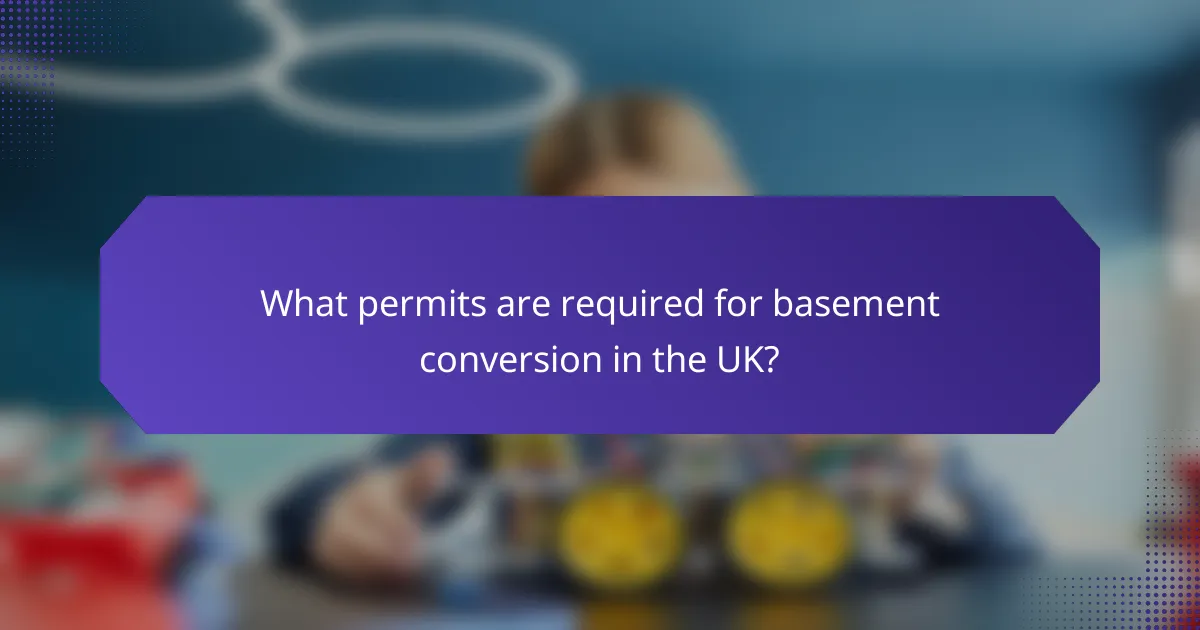
What permits are required for basement conversion in the UK?
In the UK, basement conversions typically require several permits to ensure compliance with building regulations and local planning laws. Key permits include planning permission and building regulations approval, which help ensure safety and structural integrity.
Common permits needed
The most common permits for basement conversions in the UK include planning permission and building regulations approval. Planning permission is necessary if the conversion alters the external appearance of the property or if the property is in a conservation area. Building regulations approval is required to ensure that the conversion meets safety standards, including structural integrity, fire safety, and ventilation.
Additionally, if the basement conversion involves significant excavation, you may need to consider a Party Wall Agreement if your property shares a wall with a neighbor. This agreement protects both parties’ interests during construction.
Cost of permits
The cost of permits for a basement conversion can vary widely depending on your location and the complexity of the project. Planning permission fees typically range from a few hundred to over a thousand pounds, while building regulations approval may cost between £200 and £500. Always check with your local council for specific fees and requirements.
It’s essential to factor these costs into your overall budget for the conversion. Failing to obtain the necessary permits can lead to fines and complications during the construction process, so ensure all paperwork is in order before starting your project.
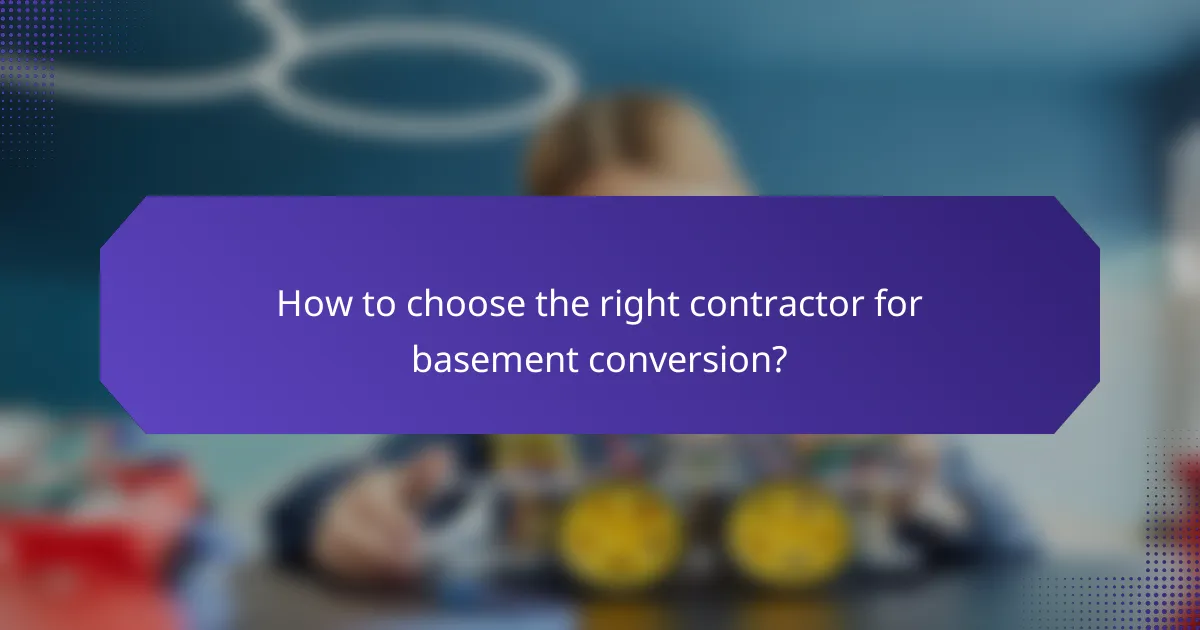
How to choose the right contractor for basement conversion?
Selecting the right contractor for a basement conversion is crucial for ensuring quality work and adherence to budget. Focus on experience, reputation, and clear communication to find a contractor who meets your specific needs.
Key criteria for selecting a contractor
When choosing a contractor for your basement conversion, consider their experience with similar projects. Look for professionals who have completed multiple basement renovations and can provide references or a portfolio of their work.
Verify that the contractor is licensed and insured, as this protects you from liability in case of accidents. Additionally, check if they comply with local building codes and regulations, which can vary significantly by region.
Questions to ask potential contractors
Before hiring a contractor, ask about their project timeline and availability. Understanding how long the conversion will take and when they can start will help you plan accordingly.
Inquire about their payment structure and any potential additional costs. A reputable contractor should provide a detailed estimate and be transparent about any factors that could affect the final price.
Finally, ask for a written contract that outlines the scope of work, materials to be used, and warranties. This document will serve as a safeguard for both parties and help prevent misunderstandings during the project.

What are the common challenges in basement conversion projects?
Basement conversion projects often face challenges such as structural issues and moisture concerns. Addressing these problems early can save time and costs while ensuring a successful transformation.
Structural issues
Structural issues in basement conversions typically involve the integrity of the foundation and load-bearing walls. It’s crucial to assess whether the existing structure can support the intended changes, especially if adding rooms or heavy fixtures.
Engaging a structural engineer is advisable to evaluate the basement’s condition. They can recommend necessary reinforcements, which may include underpinning or installing additional support beams, often costing several thousand dollars depending on the extent of the work.
Moisture and dampness concerns
Moisture and dampness are significant challenges in basement conversions, as these areas are prone to water infiltration. Proper waterproofing is essential to prevent mold growth and structural damage, which can lead to costly repairs.
Common solutions include installing sump pumps, drainage systems, and vapor barriers. The cost of these measures can vary widely, typically ranging from hundreds to thousands of dollars, depending on the specific requirements and local conditions.

What are the emerging trends in basement conversions?
Emerging trends in basement conversions focus on maximizing space efficiency, enhancing energy efficiency, and integrating smart home technology. Homeowners are increasingly looking to transform basements into functional living areas, such as home offices, gyms, or rental units, while ensuring these spaces are comfortable and sustainable.
Finishing costs for basement conversions
Finishing costs for basement conversions can vary widely based on factors like location, size, and the quality of materials used. On average, homeowners might expect to spend anywhere from $20 to $60 per square foot for a complete finish, which includes flooring, walls, and ceilings.
It’s essential to prioritize your budget by determining which elements are most important. For instance, investing in high-quality insulation and waterproofing can save money in the long run by preventing future issues. Always obtain multiple quotes from contractors to ensure competitive pricing.
Insulation pricing for basement conversions
Insulation pricing for basement conversions typically ranges from $1 to $3 per square foot, depending on the type of insulation chosen. Common options include fiberglass batts, spray foam, and rigid foam boards, each offering different levels of thermal performance and moisture resistance.
When selecting insulation, consider the climate and potential humidity levels in your area. Proper insulation not only helps maintain a comfortable temperature but also reduces energy costs. Ensure that any insulation used complies with local building codes and standards.
Labor rates for basement conversions
Labor rates for basement conversions can vary significantly based on geographic location and the complexity of the project. In the United States, hourly rates for skilled labor can range from $50 to $150, depending on the trade, with general contractors typically charging a flat fee or a percentage of the total project cost.
To manage labor costs effectively, plan your project thoroughly and communicate clearly with your contractor. Avoiding last-minute changes can help keep labor expenses in check. Additionally, consider hiring local professionals who understand regional regulations and building practices.






